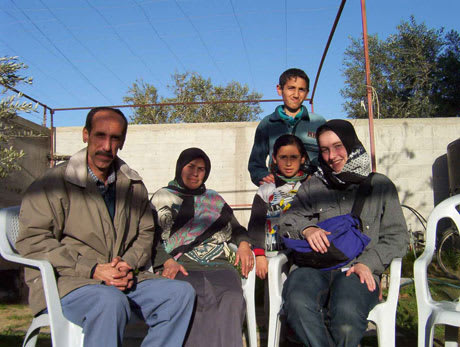Rachel Corrie was an American peace activist who died beneath a bulldozer in the Gaza Strip in March 2003. Neither a Palestinian nor Jew, but a college student from Washington state who wanted to witness the destruction of Palestinian homes by Israel Defense Forces for herself, Corrie made headlines around the world as a martyr for the Palestinian cause.
French director Simone Bitton explores her death from all angles. She interviews Palestinians who knew Rachel, American friends, her parents from suburban Olympia, WA, other activists and her political professors at Evergreen State College. Predictably, they paint a portrait of a committed, idealistic young woman who took a big risk. Too big.
To her credit, Bitton gives equal screen time to a spokeswoman of the Israel Defense Forces, an Israeli soldier (in disguise), another soldier who headed the military investigation and even the Israeli doctor who performed Corrie's autopsy. Here, the film takes on greater dimensions. The anonymous solider admits to casually killing innocent civilians to scare Palestinians out of their homes before bulldozers finished the wrecking job. "It was routine," he explains without guilt. The investigator sounds sincere but his findings reek of cover-up. Remarkably, the coroner concludes that the 65-ton bulldozer that Corrie faced did not directly kill her but allows that it played a part. His statement contradicts eyewitnesses at the scene who saw marks on Rachel's body.
There is no video footage of Rachel, just her diaries that others read. Grainy surveillance video, taken from a distance, captures the moments right before the bulldozer struck her. Rachel is absent yet everywhere in this film. Bitton's sympathies lies with Rachel and her cause, 'though she presents all sides of the story.
The director has done her homework but the weakness of the film is the dispassionate tone Rachel adopts. There are numerous talking heads and shots without voices or music. At times, the documentary feels clinical, as if its cool distance is contrasting the fervent idealism of young Rachel Corrie.
In the end, Rachel serves to inflame debate about the Gaza Strip, something that Corrie would've wanted.
(Arte France Cinéma)French director Simone Bitton explores her death from all angles. She interviews Palestinians who knew Rachel, American friends, her parents from suburban Olympia, WA, other activists and her political professors at Evergreen State College. Predictably, they paint a portrait of a committed, idealistic young woman who took a big risk. Too big.
To her credit, Bitton gives equal screen time to a spokeswoman of the Israel Defense Forces, an Israeli soldier (in disguise), another soldier who headed the military investigation and even the Israeli doctor who performed Corrie's autopsy. Here, the film takes on greater dimensions. The anonymous solider admits to casually killing innocent civilians to scare Palestinians out of their homes before bulldozers finished the wrecking job. "It was routine," he explains without guilt. The investigator sounds sincere but his findings reek of cover-up. Remarkably, the coroner concludes that the 65-ton bulldozer that Corrie faced did not directly kill her but allows that it played a part. His statement contradicts eyewitnesses at the scene who saw marks on Rachel's body.
There is no video footage of Rachel, just her diaries that others read. Grainy surveillance video, taken from a distance, captures the moments right before the bulldozer struck her. Rachel is absent yet everywhere in this film. Bitton's sympathies lies with Rachel and her cause, 'though she presents all sides of the story.
The director has done her homework but the weakness of the film is the dispassionate tone Rachel adopts. There are numerous talking heads and shots without voices or music. At times, the documentary feels clinical, as if its cool distance is contrasting the fervent idealism of young Rachel Corrie.
In the end, Rachel serves to inflame debate about the Gaza Strip, something that Corrie would've wanted.
